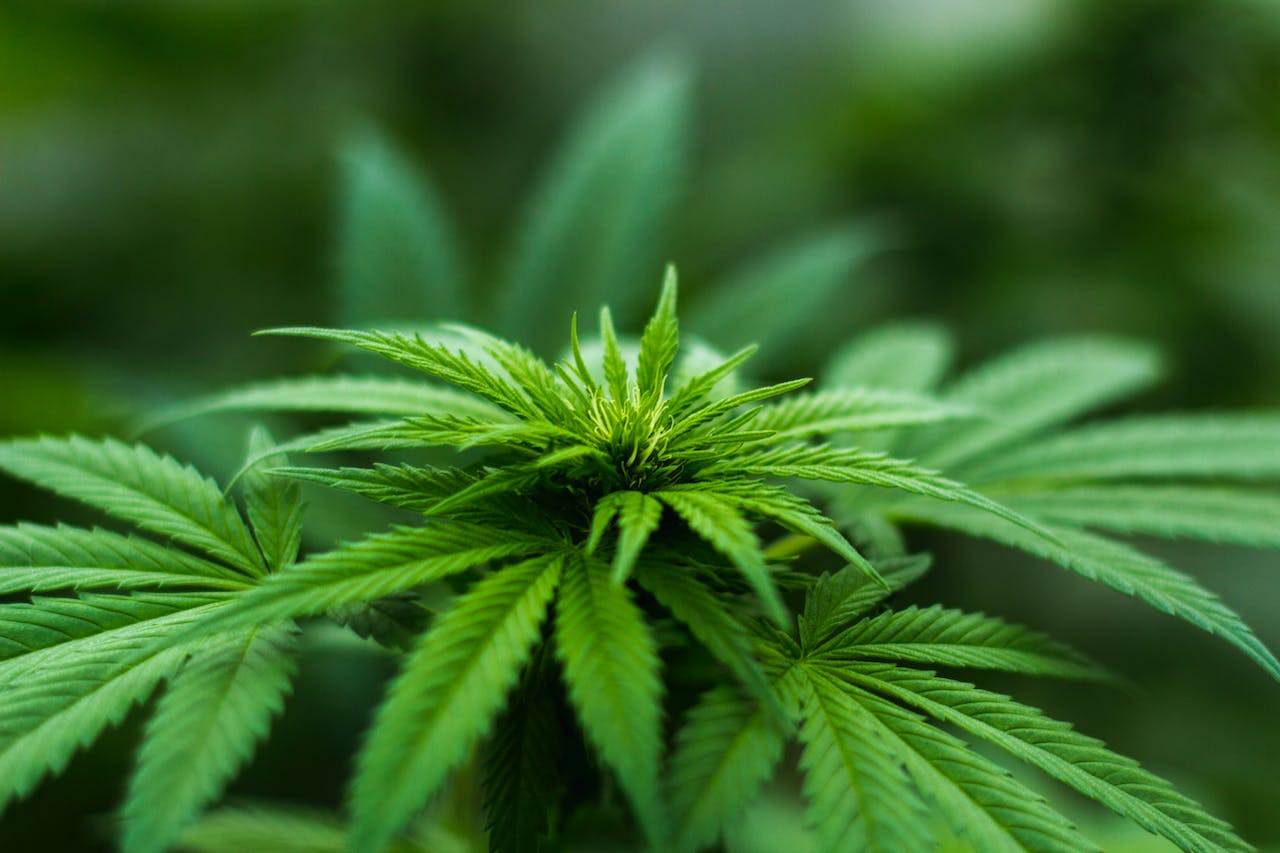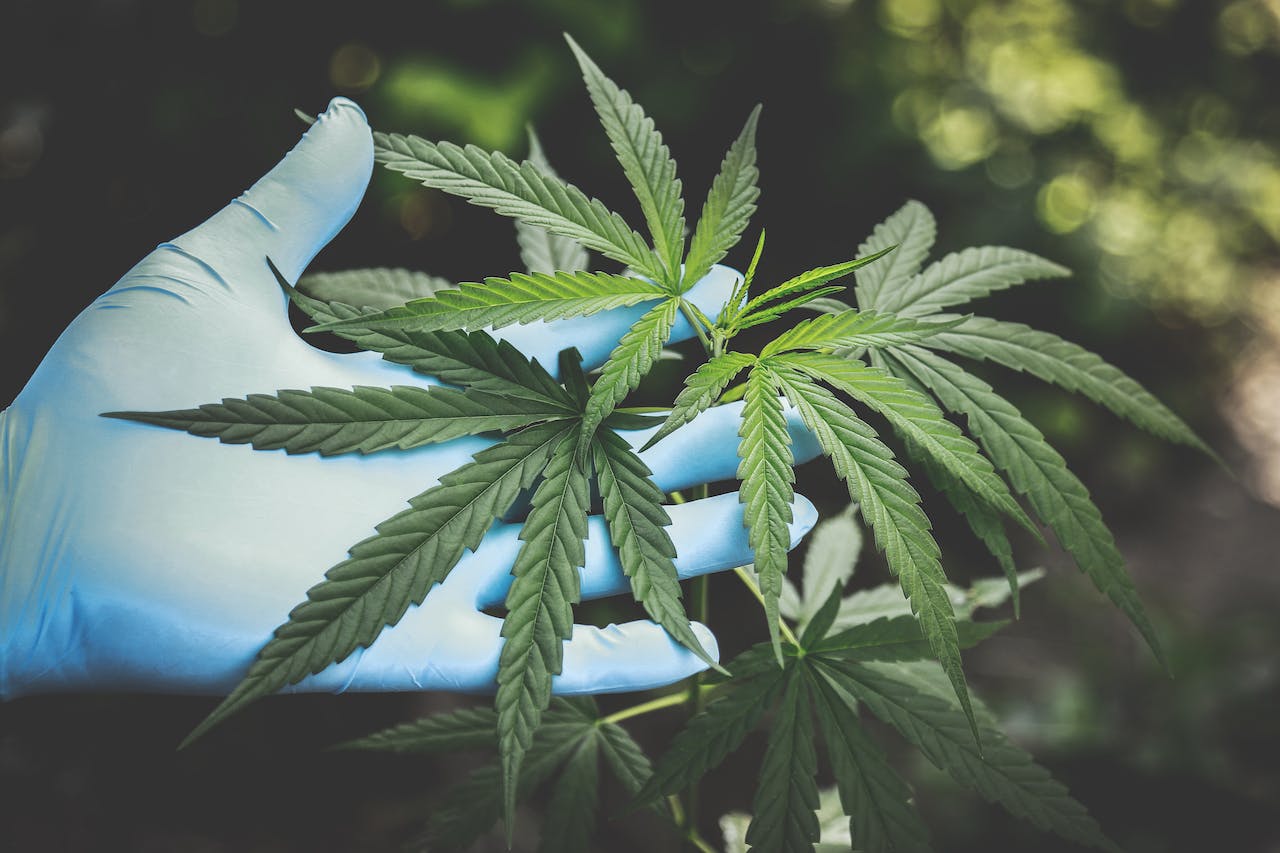Can Marijuana Cause Stomach Ulcers - What Does The Research Say About It
Some individuals wonder, can marijuana cause stomach ulcers, while others seek scientific evidence to understand the relationship between the two.
Author:Suleman ShahReviewer:Han JuDec 30, 202314.7K Shares670.7K Views

Marijuana is a well-liked psychoactive substance that has a long historyof use for both therapeutic and recreational reasons. However, there are worries over the possible dangers that are related to the usage of this product.
One of the questions that has been raised is whether marijuana can cause stomach ulcers. Ulcers of the stomach are a painful ailment that may make one uncomfortable and perhaps lead to more significant issues with one's health.
In the following, we are going to discuss the connection between marijuana use and stomach ulcers. This article will help you get vital insights about whether can marijuana cause stomach ulcers. This question has sparked significant debate and curiosity among both researchers and the general public. The potential link between marijuana and stomach ulcers has become a topic of interest in recent years.
How Ulcers Form
An open irritated sore that develops on the outside or inside of the body is called an ulcer. Different organs throughout the body might develop ulcers.
For instance, the breakdown of the mucous lining surrounding and shielding the stomach allows gastric acids and enzymes to erode the stomach walls, leading to the development of a stomach ulcer in the stomach lining.
Ulcers are typically brought on by infection and inflammationbecause the stomach bacterium Helicobacter pylori is present there. Non-steroidal anti-inflammatory drug (NSAID) abuse can also lead to stomach ulcers since it can aggravate the lining of the stomach and affect specific molecules that would otherwise aid in healing.
Ulcers can also be brought on by severe psychological anguish. A gastric ulcer is another name for a stomach ulcer. This is only one kind of peptic ulcer; another kind is termed a duodenal ulcer, and it develops in the duodenum, a portion of the small intestine. In addition to this, ulcers can also form in other bodily parts, like the esophagus.
Signs Of Stomach Ulcers
Abdominal discomfort is the most typical sign of a stomach ulcer. Patients often describe the sensation as burning or gnawing, and it frequently happens at night or two to three hours after eating. Although it commonly originates in the middle of the abdomen, it may spread to the back, belly button, or chest. The following are some other common signs of a stomach ulcer.
- Heartburn
- nausea
- decreased appetite
- Loss of weight
A stomach ulcer may burst in extreme situations, resulting in internal bleeding. If you have any of the following symptoms, get help right away.
- vomit that is bloody (may seem brown or bright red)
- Slick, dark stools
- An abrupt, acute ache that worsens over time
What Causes Stomach Ulcers?
There are a number of reasons why stomach ulcers might occur, but one frequent culprit is the bacteria Helicobacter pylori, or H. pylori. These bacteria colonize the stomach and cause inflammation (gastritis), which eventually results in ulceration. It is estimated that H. pylori causes between 70 and 90 percent of stomach ulcers.
Prolonged usage of non-steroidal anti-inflammatory medicines (NSAIDs) such as aspirin, ibuprofen, diclofenac, and naproxen is another crucial factor contributing to stomach ulcers.
Although these drugs are good at reducing inflammation and relieving pain in the muscles and joints, prolonged use of them might irritate the stomach lining and lead to the development of ulcers. The risk of ulcers increases with large dosages or frequent, long-term NSAID use.
There is no evidence to support the theory that stress and confident lifestyle choices, such as food, may cause stomach ulcers. It's thought that smoking, drinking, and spicy meals irritate the stomach, thereby making pre-existing disorders worse. Recognizing these many reasons helps in the prevention of stomach ulcers as well as their focused treatment.
Traditional Stomach Ulcer Treatments
Proton pump inhibitors (PPIs) are the typical drugs used by clinicians to treat stomach ulcers. They consist of pharmaceuticals such as omeprazole and lansoprazole. PPIs are effective because they inhibit the formation of acid in the stomach. In addition to taking PPIs, antibiotic treatment is required for someone who has been diagnosed with an H. pylori infection.
Over-the-counter medications like antacids might provide short relief from the symptoms of stomach ulcers. Nevertheless, unless the underlying cause is addressed, the symptoms will continue to reappear.
Marijuana's Impact On Stomach Functionality
Marijuana has gained attention recently as a possible treatment for a number of gastrointestinal problems, including diarrhea and stomach discomfort associated with illnesses like Crohn's disease and ulcerative colitis.
The connection between cannabinoids and the endocannabinoid system, a sophisticated signaling network made up of cannabinoids and cannabinoid receptors, is what gives rise to this therapeutic potential.
Cannabis-derived cannabinoids, such as tetrahydrocannabinol (THC) and cannabidiol (CBD), also bind to receptors, especially the cannabinoid receptor type 1 (CB1 receptor) in the gastrointestinal system. This is true even though our bodies naturally manufacture cannabinoids.
In addition to protecting against diseases like irritable bowel syndrome (IBS) and inflammatory bowel disease (IBD), activation of CB1 receptors also influences factors like gastric acid secretion, gastric emptying, motility-related disorders, and relaxation of the esophageal sphincter.
Studies reveal that THC-rich cannabis extracts may suppress the release of stomach acid by activating CB1 receptors. Furthermore, the antioxidant, vasodilator, and anti-inflammatory qualities of cannabis point to possible safeguards for the gastric mucosa or inner lining of the stomach.
This preventive function could include defending the mucosa of the stomach against dangerous compounds such as nonsteroidal anti-inflammatory medications (NSAIDs), which are well-known for their ability to cause gastric ulcers.
On the other hand, persistent and long-term cannabis usage may have adverse effects on gastrointestinal health. Rarely, it may result in cannabis hyperemesis syndrome (CHS), a disorder that causes nausea, vomiting, and stomach discomfort. CHS probably contributes to the development of stomach ulcers as well.
The Benefits Of Medical Marijuana For Stomach Ulcers
Pain Relief
Medical marijuana has been shown to be an effective means of reducing stomach ulcer discomfort. THC and CBD, in particular, two of the cannabinoids present in cannabis, are well recognized for their analgesic effects.
In addition to relieving pain, they help manage typical adverse effects, including nausea, making ulcer therapymore pleasant for patients.
Digestive Protection
One significant advantage of medicinal marijuana for stomach ulcers is that it may shield the digestive system. Research conducted on animals has shown that the natural cannabinoids found in the body, known as endocannabinoids, may significantly contribute to the reduction of inflammation.
This anti-inflammatory action helps counteract the harmful effects of gastric acid by penetrating the stomach walls. This two-pronged approach not only helps treat current ulcers but may also stop further harm from occurring.
Antiemetic Effects
In addition to its analgesic properties, medicinal marijuana has strong antiemetic properties that make it an effective treatment for nausea and vomiting brought on by stomach ulcers. Cannabinoids and the endocannabinoid system interact to control the nausea response, which eases the pain associated with ulcers in those who experience it.
Excitation Of Appetite
Loss of appetite is a common side effect of stomach ulcers, which makes it more difficult for the body to mend and recuperate. It has been noted that medical marijuana increases appetite, a phenomenon known as the "munchies."
For those who have stomach ulcers, this increased hunger may be advantageous since it will guarantee they get the nutrients they need for the best possible recovery.
Relationship Between Cannabis And Ulcers
Research has shown that cannabis use problems dramatically increase the risk of peptic ulcer hospitalization by 18%. Given that cannabis use disorders are the subject of this study, it's possible that the higher risk only occurs when cannabis is abused. With careful dosage, these risks might be significantly reduced.
Despite the fact that some of the components of cannabis have anti-inflammatory properties, there is a contradictory idea that cannabis may also raise the risk of inflammation, which might result in stomach ulcers.
Cannabis's analgesic qualities, which lessen pain sensitivity, may conceal persistent inflammation, impeding conventional treatment-seeking behaviors and perhaps aggravating the condition of stomach ulcers.
Positively, there is some evidence to support the idea that cannabis usage may prevent stomach ulcers. Preclinical research on rats suggests that THC, a cannabis component, when taken orally and subcutaneously, prevents the formation of stomach ulcers.
The use of cannabinoids, such as those found in cannabis, may prevent the development of stomach ulcers brought on by NSAIDs and pylorus ligation.
Moreover, cannabis may help cure and mend gastric ulcers due to its possible gastroprotective properties, which include lowering stomach motility, reducing gastric acid output, and relaxing the lower esophageal sphincter.
More broadly, the analgesic and analgesic properties of cannabis point to possible advantages in the treatment of the discomfort that accompanies stomach ulcers. Gaining an understanding of these complex factors enables a fair assessment of the advantages and disadvantages of cannabis usage in relation to stomach ulcers.
What Does The Research Say About Ulcers And Medical Cannabis?
Fundamental research on animals has shown that using more significant amounts of THC in rats and other animals may reduce the amount of acid secreted when pentagastrin and histamine are present. According to one study, giving rats with stomach ulcers caused by an injection of 100 mg/kg of THC six hours later prevented the ulcers from forming.
In a human investigation including ninety participants, alterations in stomach acid output were linked to reduced levels of stomach acid among cannabis users. In this investigation, the amounts of stomach acid secreted after cessation were measured in human participants who smoked more than two days per week.
According to this study, THC may also be used to prevent stomach or gastric ulcers in people. Larger, more meticulously conducted randomized studies are required to validate the possible advantages and long-term consequences of THC for stomach diseases.
A review published in Cannabis and Cannabinoid Research states that there is evidence to support the use of cannabis in treating patients with gastroesophageal reflux disease(GERD) by reducing inflammation and mucosal damage of the stomach lining, as well as by having anti-inflammatory effects in the esophagus and relaxing the lower esophagus.
Researchers think that CB2 receptors may also help with bronchoconstriction, which plays a role in the persistent cough that smokers and GERD patients often acquire. Peptic ulcers and GERD are potentially dangerous illnesses that need careful, continuous care and close monitoring from medical professionals.
How To Use Cannabis And CBD Oil For Stomach Ulcers
Smoking cannabis is the most common method to utilize marijuana. Smoking, on the other hand, is one thing that may make stomach ulcers worse. It could thus be wiser to choose a different mode of consumption.
There is no proof that we could uncover that there is a better method to use cannabis for stomach ulcers. We may speculate, nevertheless, that consumables made from cannabis or CBD would be especially helpful. After they are consumed, they have to go through the digestive system, which means that their cannabinoids get straight to the source.
It is strongly advised that people who reside in states where cannabis is legal to buy their goods from authorized dispensaries. By doing this, they lower their chance of buying things that could be contaminated by goods obtained from unreliable sources.
Similarly, if someone decides to purchase CBD products, they should be sure to do so from a reliable and respectable company. Several businesses are offering subpar goods with small amounts of active cannabinoids. We advise purchasing CBD online from a business that posts lab data from other parties on their website. These studies guarantee that customers are receiving safe and effective products.
Other Potential Risks Of Marijuana Use
Marijuana usage has extra hazards that should be taken into account, in addition to the possible effects on gastrointestinal health. The risk of lung harm from marijuana smoking is one crucial issue. Similar to tobacco smoke, inhaling cannabis smoke exposes the lungs to toxic chemicals that might eventually cause respiratory problems.
Chronic marijuana use has been connected to symptoms, including a higher risk of respiratory infections and chronic bronchitis. To reduce any injury to the respiratory system, users must be aware of these dangers and consider other modes of intake, such as edibles or vaporization.
Additionally, there is a chance of addiction associated with marijuana usage, especially for those who are prone to drug abuse. THC, the psychoactive ingredient in marijuana, may cause tolerance and dependency, which can eventually lead to addiction.
Even though marijuana addiction may not be as bad as addiction to other drugs, it can nevertheless have a significant impact on a person's daily lifeand general well-being.
Can Marijuana Cause Stomach Ulcers
The connection between vapingmarijuana and the development of stomach ulcers is a topic that requires careful consideration. Although there isn't much study on this particular link, it's essential to recognize that vaping has specific possible hazards. Vaping is breathing vaporized materials, and it's unclear exactly how vaporized cannabis affects the digestive tract.
Vaping raises specific concerns since it can introduce chemicals and other substances into the body, which might have an impact on gastric health. Furthermore, some data suggests some of the substances in vaping liquids may be harmful to the respiratory system, which may have an indirect influence on digestive function.
The production of gastric acid and inflammation are two common causes of stomach ulcers. Although vaping may not directly cause stomach ulcers, there are concerns over its possible influence on gastrointestinal health because of its potential for systemic effects on numerous biological processes.
People who vape marijuana should be aware of the knowledge gaps that currently exist and should keep an eye on their general health, taking into account things like inflammation and gastrointestinal distress.
How To Avoid Getting Ulcers In Your Stomach
There are specific steps you may take to lower your chance of getting stomach ulcers if you are worried about the effects of smoking marijuana on your digestive tract.
- To start, you should make an effort to cut down on your marijuana consumption. You may lower your chance of getting stomach ulcers by reducing the amount of marijuana you smoke.
- Second, using marijuana on an empty stomach is not recommended. Consuming food before lighting up can help protect your stomach from the harmful effects that THC may have.
- Last but not least, you should think about taking a break from using marijuana completely. If you are able to give up smoking for an extended period of time, any ulcers that are already present in your stomach will have the opportunity to heal.
Can Marijuana Cause Stomach Ulcers - FAQs
Can Weed Impact The Process Of Stomach Emptying?
Patients with gastroparesis should refrain from using marijuana (THC) due to its considerable delay in stomach emptying, according to the American College of Gastroenterology.
Why Do Stomach Ulcers Occur?
Non-steroidal anti-inflammatory medications (NSAIDs) or the Helicobacter pylori (H. pylori) bacteria are the leading causes of stomach ulcers.
Is It Possible To Consume CBD For Stomach Ulcers?
Some Studies that have been published in the Journal of Dental Research back up the use of CBDto treat trauma or acid-induced stomach ulcers.
Conclusion
Recent research points to cannabis having preventive qualities against stomach ulcers rather than being a direct cause, notwithstanding the lack of data from human-based clinical studies.
Users must proceed with care, understanding that the analgesic effects of cannabis may conceal the underlying pain and inflammation related to stomach ulcers, thereby postponing medical attention. I hope you understand now all about the "can marijuana cause stomach ulcers".
For those navigating the complicated terrain of stomach ulcer health, finding a balance between appreciating possible preventive advantages and being alert about the intricacies of cannabis usage is vital.
Jump to
How Ulcers Form
Traditional Stomach Ulcer Treatments
Marijuana's Impact On Stomach Functionality
The Benefits Of Medical Marijuana For Stomach Ulcers
Relationship Between Cannabis And Ulcers
What Does The Research Say About Ulcers And Medical Cannabis?
How To Use Cannabis And CBD Oil For Stomach Ulcers
Can Marijuana Cause Stomach Ulcers
How To Avoid Getting Ulcers In Your Stomach
Can Marijuana Cause Stomach Ulcers - FAQs
Conclusion

Suleman Shah
Author
Suleman Shah is a researcher and freelance writer. As a researcher, he has worked with MNS University of Agriculture, Multan (Pakistan) and Texas A & M University (USA). He regularly writes science articles and blogs for science news website immersse.com and open access publishers OA Publishing London and Scientific Times. He loves to keep himself updated on scientific developments and convert these developments into everyday language to update the readers about the developments in the scientific era. His primary research focus is Plant sciences, and he contributed to this field by publishing his research in scientific journals and presenting his work at many Conferences.
Shah graduated from the University of Agriculture Faisalabad (Pakistan) and started his professional carrier with Jaffer Agro Services and later with the Agriculture Department of the Government of Pakistan. His research interest compelled and attracted him to proceed with his carrier in Plant sciences research. So, he started his Ph.D. in Soil Science at MNS University of Agriculture Multan (Pakistan). Later, he started working as a visiting scholar with Texas A&M University (USA).
Shah’s experience with big Open Excess publishers like Springers, Frontiers, MDPI, etc., testified to his belief in Open Access as a barrier-removing mechanism between researchers and the readers of their research. Shah believes that Open Access is revolutionizing the publication process and benefitting research in all fields.

Han Ju
Reviewer
Hello! I'm Han Ju, the heart behind World Wide Journals. My life is a unique tapestry woven from the threads of news, spirituality, and science, enriched by melodies from my guitar. Raised amidst tales of the ancient and the arcane, I developed a keen eye for the stories that truly matter. Through my work, I seek to bridge the seen with the unseen, marrying the rigor of science with the depth of spirituality.
Each article at World Wide Journals is a piece of this ongoing quest, blending analysis with personal reflection. Whether exploring quantum frontiers or strumming chords under the stars, my aim is to inspire and provoke thought, inviting you into a world where every discovery is a note in the grand symphony of existence.
Welcome aboard this journey of insight and exploration, where curiosity leads and music guides.
Latest Articles
Popular Articles




